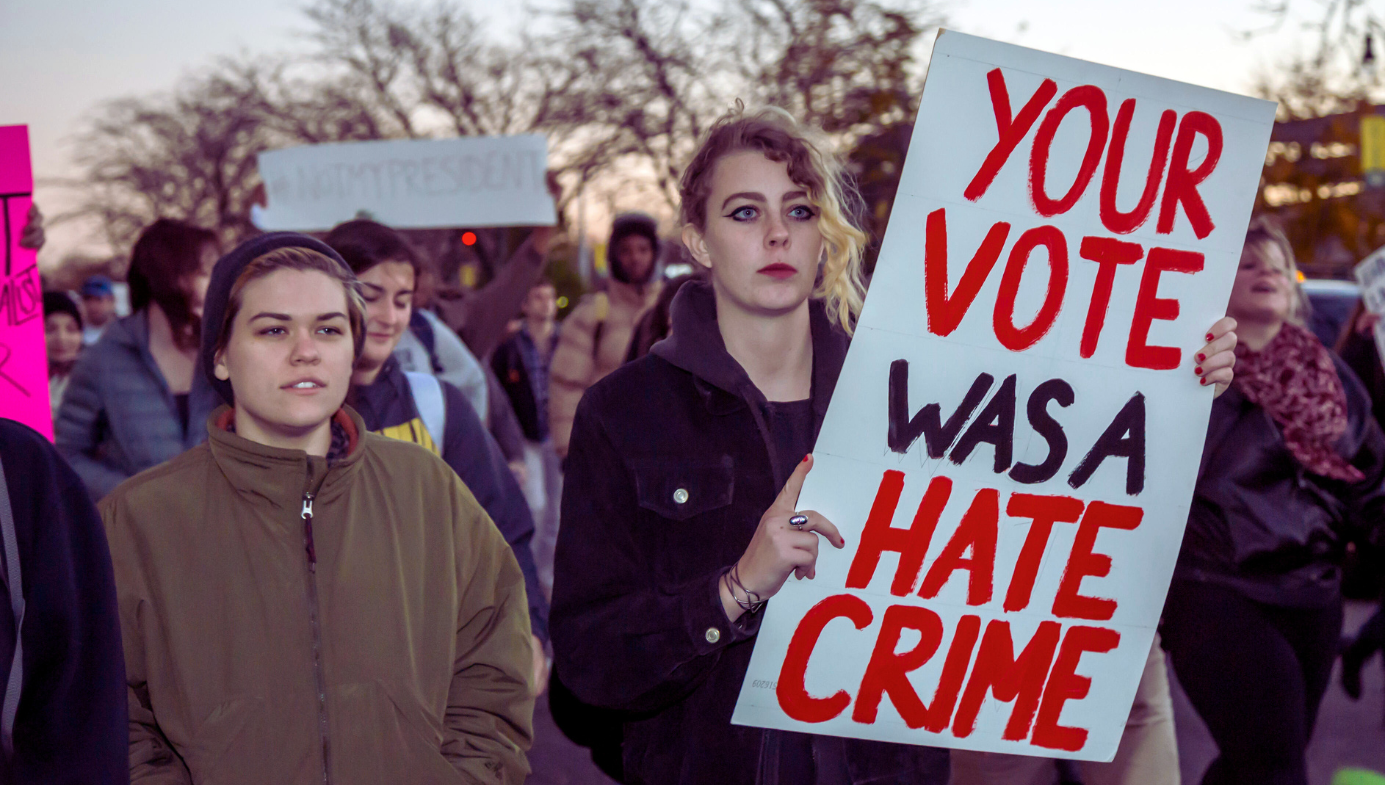Education
An Israeli Agent on Campus
The need for bridge-building and constructive dialogue has been overtaken by the belief that everyone in Israeli society is complicit in that nation’s uniquely deplorable sins.

In late 2017, having completed a Masters in History and another in Political Science, I was considering the possibility of a PhD in Middle Eastern Studies. The academic path and research-heavy workload were a natural fit and I figured it would buy me some time to reflect on what I wanted to do with the rest of my life. So, at the end of last year, I contacted a handful of professors whose academic interests overlapped with mine to ask their advice. The first two of these were productive and fruitful, and focused mostly on research, career advice, and language skills—par for the course for a graduate student in search of a supervisor. However, my third attempt did not go well at all, and the experience has led me to worry about the effects of ideological homogeneity on university scholarship, particularly in the field of Middle Eastern history and politics.
On December 13, I wrote a short email to Jens Hanssen, an Associate Professor of Middle Eastern and Mediterranean History at the University of Toronto. I explained that I was a graduate student at the Munk School of Global Affairs, that I had found his profile on the History Department website, and that I was hoping to ask him some questions about Middle Eastern history and academia. Later that day, Professor Hanssen responded:
Dear Mr. Blaff, You have probably contacted me because you were alerted to an interview I gave last week to the News Section of UofT’s website on President Trump’s declaration to recognize Jerusalem as the capital of Israel. Now, you may be a graduate student at the Munk School, but you are also a Hasbara fellow. As far as I know, Hasbara fellows are Israeli advocacy activists sent to North American campuses on behalf of the World Union of Jewish Students, now under the auspices of the new Israeli Ministry of Strategic Affairs and Public Diplomacy, which earlier this year has called for a “new offensive against Boycott, Divestment and Sanctions” activists.
He then informed me that I had received instruction from something called “The Hasbara Handbook: Promoting Israel on Campus”—a text I had never heard of, let alone read—about “how to approach professors, students and administrators and convince them that legitimate, non-violent criticism of the state of Israel amounts to discrimination against Jews everywhere.” Hanssen continued: “In fact you [are] instructed to conflate Judaism and Zionism and are encouraged to give the impression on our campus that such criticism constitutes antisemitism.”
He went on to accuse me of “slandering” a number of people in an article that he claimed (incorrectly) I had written for the student newspaper the previous September (it actually ran on the Hasbara Fellowship’s blog page). He concluded by announcing that, while the Munk School might be indifferent to the “grave threat Hasbara organizations such as yours pose to academic freedom and the intellectual independence of the university,” he most certainly was not. Consequently, for “ethical and academic” reasons, he would avoid any interaction with people such as myself.
Somewhat taken aback, I responded by explaining that I was unaware of his interview and re-affirming my hope of soliciting career advice. “[In spite] of our philosophical differences,” I wrote, “on a professional level, I thought perhaps seeking your advice on matters pertaining to academic life, pursuing a PhD, and the skills needed to publish on Israel-Palestine could be very helpful.” I closed by saying that if he would agree to meet me for a coffee, I’d be grateful for his input. Answer came there none.
* * *
One of the principal reasons I contacted Professor Hanssen was the robustness of his resume. The breadth of his language skills—German, English, Arabic, French, Turkish/Ottoman, and Spanish—made a wealth of primary sources available to him. In addition, Hanssen’s D.Phil from Oxford, his own distinguished PhD supervisor, and his active role in the doctoral process at the University of Toronto all suggested that an academic partnership could be immensely valuable to me.
Perplexed by our email exchange, I decided to try and find out more about the person behind the academic accolades. A Google search quickly turned up a series of articles and videos from which Hanssen emerged as a sort of scholar-activist, whose actions periodically attracted minor headlines. In 2010, Hanssen invited Omar Barghouti to the University of Toronto, an event he described as “a great privilege and an immense pleasure” to host:
Barghouti is a co-founder of the anti-Zionist Boycott, Divestment, and Sanctions (BDS) movement and has a history of inflammatory statements. In a 2014 speech, he informed his audience that “Definitely, most definitely, we oppose a Jewish state in any part of Palestine. No Palestinian—no rational Palestinian, not a sellout Palestinian—will ever accept a Jewish State in Palestine.”
In 2016, Hanssen was one of 100 co-signatories to an open letter sternly criticizing an academic trip to Jerusalem to discuss urban planning, and a U of T article about the visit. The letter denounced the supposedly troubling academic relationship shared by the University of Toronto and the Hebrew University in Jerusalem. Despite the city’s renown for urban renewal and nature protection (the city received an award from the International Union of Conservation of Nature in 2012), the letter stated that, “Urban scholarship, and scholarship more broadly, has a responsibility to investigate and challenge—not passively reproduce—social violence and inequality.” The idea that Hanssen might support engagement with Israel is flatly contradicted, however, by his consistent support for a blanket academic boycott of the country. The previous year, he had led the censuring of Israeli academic exchange and engagement facilitated by the Middle East Studies Association (MESA), and he had served as the media spokesman for a campaign advocating an academic boycott of Israel by librarians and scholars.
It ought to go without saying—though evidently it does not—that it is perfectly possible to make legitimate and worthwhile criticisms of Israeli policy in the territories, Jerusalem, or its approach to the peace process. These are politically and historically fraught and complex topics about which reasonable people of goodwill ought to be able to disagree. Indeed, Israel itself is a highly disputatious liberal democracy with a quarrelsome political class, a vibrant free press and academy, and a fiercely independent judiciary that is not afraid to rule against the government.
Nevertheless, an unwavering and rigid antipathy to Israel has increasingly become an organizing principle on many North American campuses, and the recitation of anti-Israel shibboleths is often the metric by which an activist’s commitment is measured. So, for a growing contingent of progressive students and faculty, it doesn’t matter that Israeli academia is among the most progressive forces within Israeli society—the need for bridge-building and constructive dialogue has been overtaken by the belief that everyone in Israeli society is complicit in that nation’s uniquely deplorable sins.

I was therefore unsurprised to discover that Hanssen’s professed concern for human rights seldom creeps into his own area of expertise: Lebanon. In an op-ed written by Hanssen and a University of Toronto colleague for the Toronto Star during the 2006 Israel-Lebanon War, the authors placed the burden of the conflict on Israel and beseeched Western governments to adopt a more nuanced view of its terrorist enemy. While denouncing Israel for “pushing U.S. and U.K. Middle Eastern policy,” they strove to contextualize Hezbollah’s actions, describing the militia and its terrorism as “dangerous manifestations of deeper political injustices and diplomatic failures in the Middle East that date back to the 1967 war.”
* * *
My belated discovery of all this made Hanssen’s response to my email no less dispiriting, but considerably less surprising. The article to which he mistakenly referred in his message was an opinion column I had written for the Varsity student paper back in September 2016 about what I considered to be the disproportionate international condemnation directed at Israel. Only recently did I learn that the comment below the article informing me I’d “earned my keep” and linking to the other article I’d written for the Hasbara Fellowships blog had been left by Hanssen. Unsurprisingly, and contrary to Hanssen’s speculations, I have never been instructed nor paid by the Israeli government to write that article nor any other. My writing has always been motivated by personal interest. Since my first trip to the region in 2013, the Middle East had begun to encompass a larger role in my academic life. I had travelled to Israel, Jordan, Turkey, and the Palestinian Territories, and had seen first-hand the percussive explosions of the Syrian Civil War. I returned to college in Canada intent on re-dedicating my studies to the history and politics of the modern Middle East.
I began writing about Israel and the region while I was in grad school. The extracurricular research provided me with an opportunity to sharpen my arguments and ideas beyond the purview of classwork. As an impecunious student, I kept an eye open for subsidized trips, which were an efficient way of affording the travel I so dearly enjoy. One such trip was for Hasbara Fellowships. The organization is openly pro-Israel and aims to bring young students—irrespective of religious background—to Israel to learn about history, politics, and advocacy. Hanssen seemed to believe that such trips were designed to manufacture preprogrammed propagandists. In fact, I was accompanied by a group of people from diverse backgrounds transcending nationality, ethnicity, religion, and sexual orientation, and the trip was filled with debate and disagreement. Politically, my companions ranged from Left to Right, and their views about the Israeli-Palestinian Conflict and the prospects of peace agreement varied considerably.
While participants are encouraged to engage in student politics upon returning to campus, the attrition rate is high and the activities recommended are often unglamorous—organizing cultural exchanges between student groups and hosting discussions. We were not provided with copies of the Hasbara Handbook, but my interest had been piqued by Hanssen’s reference to this supposedly sinister text, so I procured a copy. Leafing through the introduction, I came across passages like this one:
Israel is not perfect, and only a fool would pretend that she is. When confronted with atrocities such as terror attacks on teenagers, we can campaign hard on campus for the sake of Jews in Israel without believing that Israel is perfect. Israel shouldn’t have to present herself as without problems—just as no other country does. All around the world governments are attempting to tackle racism, poverty, prejudice—and Israel is no different.
On the whole, the book struck me as rather moderate and reasonable, but to Hanssen it was extreme and terrifying.
* * *
This story nearly died in my inbox. Hanssen’s email was unsettling, but when my reply went unanswered, I was tempted to shrug. My reflexive apathy, in retrospect, is disturbing. Hanssen’s views are ascendant in history departments across the country. I have personally encountered his boilerplate rhetoric in various undergraduate classes and graduate seminars over the years. Somewhere along the way I had been conditioned to dismiss such behavior as tolerable. The alternative didn’t seem worth the aggravation and embarrassment it was bound to provoke, certainly given that nothing would likely be achieved.
But the more I reflected upon my exchange with Hanssen, the more irritated I became. A young student seeking career advice had approached a professor in good faith and received a broadside indicting his political views, nationality, and loyalty. This was not some off-the-cuff remark—it was a 300-word message which Hanssen had typed and stamped with his own name. I sought advice from other Jewish students with whom I had worked in school politics on campus over the past two years. One of them, well-versed in legal matters and campus by-laws, thought it worth pursuing. However, winter vacation was nearly upon us. The school was shortening its hours and staff and students were leaving for some well-deserved R&R. I decided to revisit the matter at the start of the new semester in January.
A winter break in Florida did wonders and I returned to school recharged. I followed up with the department head. Following school protocol, I was referred to the Dean’s Office where I spoke with the Director of Critical Incidents, Safety, and Health Awareness. They presented me with the choice of an official or an unofficial investigation. The former would be public and involve lawyers; the latter would be internal, and basically involve a private conversation between Dean’s Office officials and Hanssen behind closed doors. I sat on the decision for a few days and then, on March 21, I drafted an official letter of complaint.
On April 24, I received a letter from the Vice-Dean, informing me that an internal investigation into my complaint was now underway. On August 23, I received another letter communicating the investigation’s findings, in which the University administration effectively washed its hands of the matter. Hanssen, the letter stated, had told the investigation that my email requesting advice had been an attempt to “entrap” him and he repeated his claim that “the Hasbara Fellowship organization works to ‘discredit and intimidate’ students and faculty, often by strategically conflating criticism of Israel and Zionism with Anti-Semitism.” Despite this defiance, however, he ended up walking back many of his initial accusations. According to the Vice-Dean’s report:
After reflection, Professor Hanssen acknowledged he should have said “pro-Israel activist” rather than Israeli advocacy activist and regretted using the word “slander” and should have said “criticized unduly.” He also stated he wished he had made a clearer distinction between Mr. Blaff as an individual and his involvement with the Hasbara Foundation and recognized the power differential between himself as a professor and a student.
And yet, despite Hanssen’s acknowledgement of his indiscretions to administrators, I never received a formal apology from the administration or from Hanssen himself. The report gently chastised Hanssen for his lack of civility, before concluding that the investigator did not “find that Professor Hanssen’s response to the email was discriminatory on the grounds of religion or nationality.”
Reading the report, I began to wonder if an undergraduate student should feel comfortable challenging Hanssen in class and what the consequences for expressing dissent might be. Would Hanssen have provided me with a reference letter had I been his student? Would he take on graduate students who do not share his suspicious anti-Zionism? Is there not a risk that only students who espouse certain accepted opinions receive funding, TA postings, and references? And won’t all this simply perpetuate a homogeneity of thought in a department already tending heavily in that direction?

Such questions do not appear to concern University of Toronto’s administration. On the contrary, they remain confident in Hanssen’s ability to teach courses touching upon Jewish History and Israel in spite of this incident. As a Zionist Jew, I certainty do not. Countless other community-members—fellow students and circumspect faculty—have contacted me to express bewilderment about Hanssen’s conduct. Following the publicization of this episode in the Toronto Sun, other Jewish students have confided to me that the climate in Hanssen’s Middle Eastern history course was often inhospitable. One of them told me that, during her enrolment, Jewish students disproportionately dropped the class due to its partisan nature.
My story suggests that concerns like mine are subject to a double-standard. Had an Afro-Canadian or LGBTQ student faced similar treatment, I believe the university’s administration would not have tolerated a professor’s excuses, notwithstanding his belated contrition. But nearly a decade on Ontario campuses has taught me that this is par for the course. During a graduate-level seminar on genocide, a fellow student suggested that American Jews exploit the Holocaust for political capital. Were a student to have argued that African-Americans exploit slavery or Jim Crow for political gains, the protests from progressive students and faculty would, rightly, have been vehement and immediate.
Academia ought to be a forum for the battle of minds and the testing of arguments and ideas. Instead, students such as myself seeking a fair-minded supervisor face a paucity of options as departments congeal around a monolithic interpretation of Middle Eastern politics and history. The result is that a toxic political environment has been allowed to flourish, unrestrained, in specific departments across elite universities. In an environment struggling to balance the broad aims of diversity and inclusivity, many Jewish students remain on the outside looking in.






